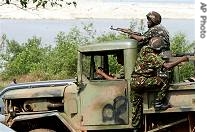2007年VOA标准英语-Guinea's Union Leaders Welcome Lighter Curfew,(在线收听)
Dakar
19 February 2007
Union leaders in Guinea are welcoming a more relaxed curfew, but are pursuing a crippling strike action. They say they want President Lansana Conte to respect agreements signed in January that have been ignored. VOA's Nico Colombant reports from Dakar.
One of the main union leaders, who initiated the strike, Radiatou Serah Diallo, tells VOA she is open to dialogue with Mr. Conte, but that negotiations are no longer needed.
She says he already signed agreements that led to the strike's brief suspension last month,
 |
| Guinean soldiers patrol a street in Conakry, Guinea, 19 Feb 2007 |
Following the deal, Mr. Conte unilaterally named officials to key national and foreign posts, and then appointed a close ally as new prime minister, Eugene Camara. This angered union leaders, opposition politicians and many young people who took to the streets again, and went on looting rampages. They had demanded an independent prime minister.
The renewed violence led to the establishment of a curfew, which was relaxed Monday, allowing people to move about from six in the morning, rather than starting at noon.
But the strike continues, with banks, government offices and major shops shut down, as has been the case for many weeks since the strike action first started in January.
A West African human-rights activist, Ibrahima Kane, is not surprised by the strike's lasting power. He says Guineans are fed up with Mr. Conte's autocratic rule since a coup in 1984.
"The society in Guinea has changed. People in Guinea are also looking at the life of people in the sub-region. It was the same situation in Mali. People managed to get rid of [former military ruler] Moussa Traore," said Kane. "Now, they have a very democratic country, a very democratic society. It was recently the same situation in Mauritania [where] people tried, even [if it was] with the help of the army, but they are now trying to organize a better society. It was even [the same] in the neighboring country, Guinea-Bissau, two years ago, the same situation and it has changed. The only country that is not changing in 30 years in the subregion is Guinea-Conakry."
In Guinea, the few times there have been attempts at mass demonstrations during the strike action, there has been fierce military repression, leaving more than 100 people dead.
A West Africa analyst with the Brussels-based International Crisis Group, Gilles Yabi, says the presidential guard, in particular played a key role in stopping demonstrations around the center of Conakry.
"The presidential guard is mainly composed of people from the same ethnic area, and even from the same family as President Conte, so these people are enjoying important economic privileges. So, we can expect them to be more loyal to President Conte, and again even follow him, even during bad situations for [Mr.] Conte himself," said Yabi.
Yabi says divisions could be possible within the army, but that this has yet to happen.
"There are a lot of high ranking officials who came to power at the same time as [Mr.] Conte, and who are completely associated to the regime. I think, they are also in a difficult situation now, and they are certainly trying to evaluate what will be best for them to follow [Mr.] Conte again for a few weeks, or now to try to change the tide, and then to have a future in a new Guinea," added Yabi.
The latest strike action started after Mr. Conte unilaterally freed two allies, who had been jailed as part of a corruption probe, amid grinding poverty, rising prices and crumbling government services.